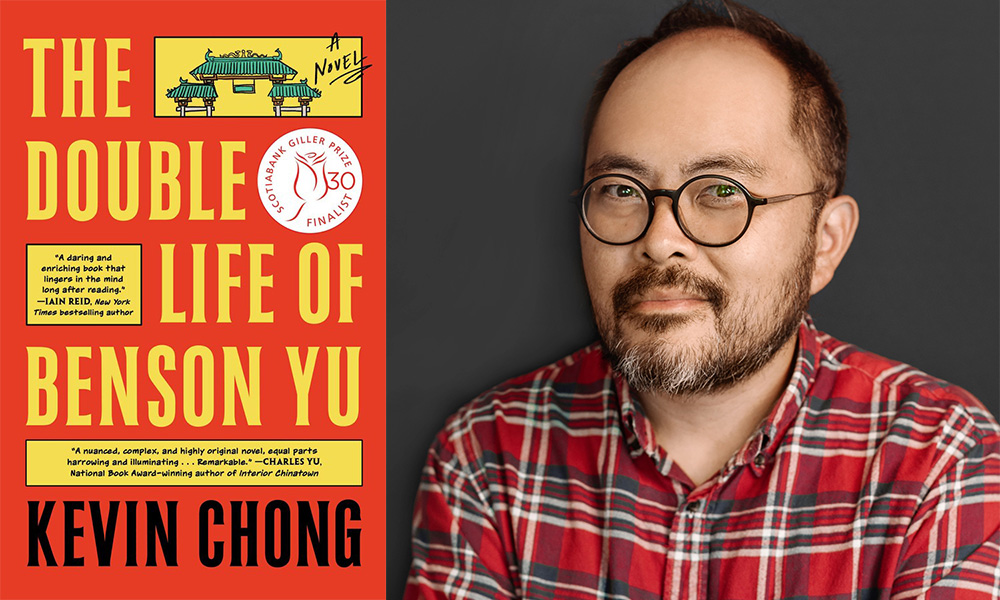
Author Kevin Chong, a UBC Okanagan professor in the Faculty of Creative and Critical Studies, says Asian Heritage Month can present challenges and opportunities for Asian Canadian artists. Credits: Author photo by Iris Chia. Book cover courtesy of Simon & Schuster.
In The Double Life of Benson Yu, author Kevin Chong’s protagonist navigates a complicated future and a traumatic past by blurring the lines between fiction and reality as a graphic novelist.
As a creative writing professor in UBC Okanagan’s Faculty of Creative and Critical Studies, Chong must remain realistic when it comes to discussions around identity and self-discovery, especially during May—Asian Heritage Month.
He appreciates the nuanced ways the month can serve as both a spotlight and a platform for Asian-Canadian content while acknowledging the emotional and intellectual labour involved in representing one’s culture and heritage.
They are comparable to the issues Chong balanced delicately in Benson Yu, a novel that earned him a place on the Giller Prize Shortlist. Here, he discusses both his personal and professional insights into Asian Heritage Month.
How do you see Asian Heritage Month affecting the identity and self-perception of younger Asian Canadians?
I think a lot about my eight-year-old daughter and how I want her to learn about her Chinese and Asian-Canadian heritage. Cultural events like the Lunar New Year are certainly part of the equation. When there’s school programming tied to that or Asian Heritage Month, it allows her to know a little more about herself.
It’s nice to see yourself in the media one consumes—whether it’s on a screen or a page. I didn’t have that growing up. At times, I would have to find it in Asian culture from Asia—in Haruki Murakami novels or Hong Kong action movies like A Better Tomorrow. At other times, I think it gave me a more whitewashed sensibility. Nowadays, I feel as though younger Asian Canadians have more opportunities to see themselves in media.
What does Asian Heritage Month mean to you as an author and educator?
It’s a springboard for my work to be shared and discussed at events as well as online and print publications. Earlier in my career, I shied away from my heritage. I wanted to be a writer, first and foremost. In contrast, I see so many younger writers voluntarily placing their backgrounds and orientations in the first lines of their biographies. I’m sort of in awe of that pride. But I’d find Asian readers through this springboard. And more recently in my career, especially in my newest book, The Double Life of Benson Yu, I’ve leaned into what it means to be part of the Asian diaspora.
As an educator, it’s a reminder and a prompt to share Asian-Canadian content.
But there can be some emotional labour called upon to bloviate on being Asian and Asian Canadian. Not only does it take time away from my research, but it also makes me spiral into thinking about whether I’m qualified to speak about Asian-Canadian culture, what I should do to feel more qualified and whether I’m a “good” Asian Canadian. For better or worse, I’ve chosen to speak on the topic.
How do you believe Asian Heritage Month contributes to the appreciation of Asian culture?
Through the awareness it raises and the content of Asian-Canadian creators, Asian Heritage Month reveals the long history and lasting impact Asians have had as settlers in this province and country.
On my mother’s side, for instance, I have two great-grandfathers who emigrated to Canada—one in 1916, the other in 1920. To my delight, I was able to find them on the UBC Library’s Register of Chinese Immigrants to Canada, 1886-1949.
I found their height, weight, occupation and the names of the ships they boarded to cross the Pacific. Because of the Head Tax, they raised their families in China—which is why I was born in Hong Kong and can claim to be both a fourth and first-generation Canadian. And yet, like every other Asian Canadian, I will always be considered a foreigner.
As we come to more deeply understand the histories of Asian Canadians, we learn there are so many different communities, many of whom had to overcome many racist obstacles and so many different waves of immigration.
How do Canadian academia and literature reflect Asian history and identity, and can Asian Heritage Month contribute to this?
According to Google, Chinese and South Asians, along with the Black community, form the three largest visible minorities in Canada. If we’re not properly represented in Canadian academia and literature—and I feel we aren’t—there’s something wrong with Canadian academia and literature.
Asian Heritage Month increases consciousness but can also be an excuse to ignore us for the other 11 months of the year.
Moreover, as I’ve learned of Asian-Canadian history through the novels of Wayson Choy, Paul Yee and William Ping, and the nonfiction of writers like Cheuk Kwan and Lily Cho, the more deeply I appreciate the courage and ingenuity of these earlier generations of Asian Canadians.
How can communities navigate celebration and appropriation during such heritage months?
If it’s led by an Asian group, then let them lead it. Wearing a culturally specific item of clothing can be appreciated in some contexts and then considered over-the-top or offensive in others. I could probably use the same Canadian politician as both a positive and negative example. When in doubt, you should consult with the event organizer.